In today's digital world, having an online store is essential for small businesses looking to expand their customer base and increase revenue. Shopify is one of the leading platforms that empower entrepreneurs to create, manage, and grow their online businesses efficiently. Whether you’re just starting out or looking to scale your existing business, Shopify offers a user-friendly and feature-rich solution to meet your needs.
I. Benefits of Shopify for Small Businesses
Shopify offers a wide range of benefits for small businesses, making it an attractive choice for entrepreneurs looking to establish and scale their online stores. Below are the key advantages of using Shopify for small businesses:
1. User-Friendly Interface
Shopify’s intuitive and user-friendly interface is one of its strongest features. Whether you’re a beginner or have limited technical knowledge, you can easily set up and manage an online store. The platform is designed to help users organize product inventories, manage sales, and personalize the design of their store using its section-based editor. This editor may not offer the same flexibility as some drag-and-drop website builders (like Wix), but it helps to keep store pages clean, organized, and visually appealing.
2. Affordability and Scalability
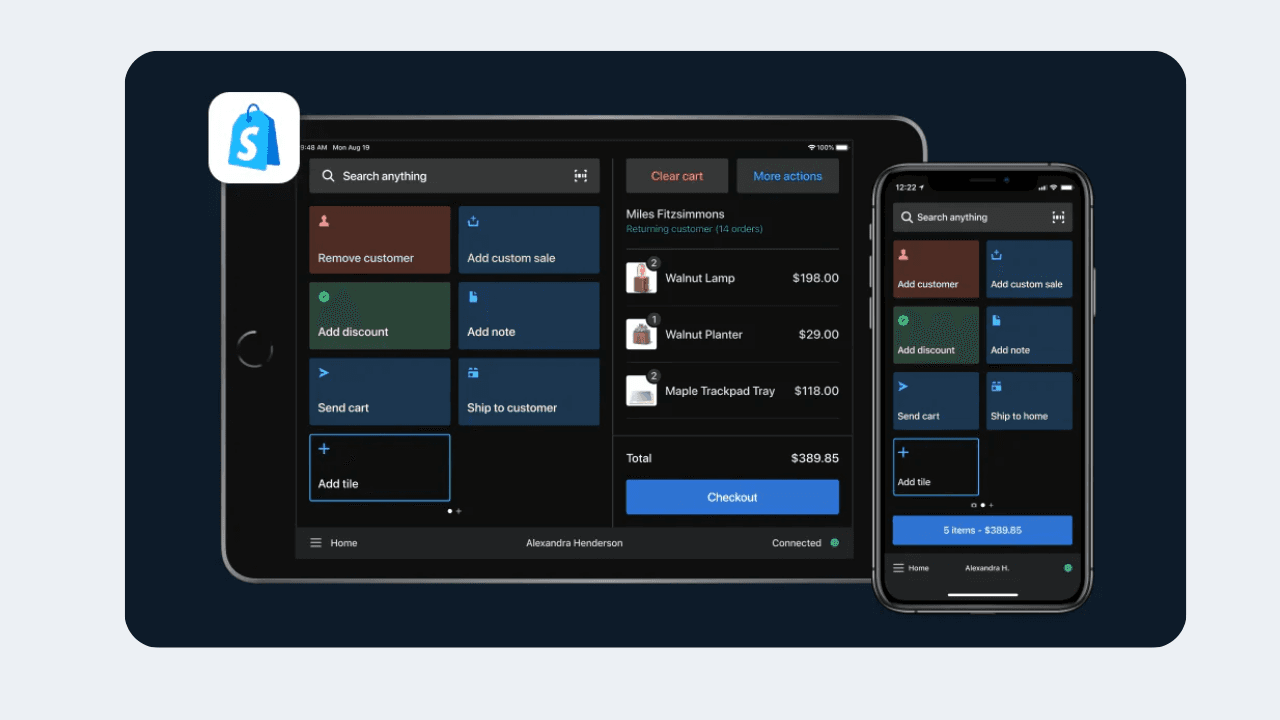 Shopify is highly scalable, making it a perfect option for businesses that plan to grow. The platform offers various pricing plans suitable for businesses at different stages. Here’s a breakdown:
Shopify is highly scalable, making it a perfect option for businesses that plan to grow. The platform offers various pricing plans suitable for businesses at different stages. Here’s a breakdown:
-
Shopify Starter Plan ($5/month): Ideal for businesses that sell through social media, SMS, or other platforms. It’s a basic plan that lets you sell with minimal setup.
-
Basic Shopify Plan ($39/month): Great for small businesses just starting, offering essential ecommerce features and customizable themes for a personalized touch.
-
Shopify Plan ($105/month): Designed for growing businesses, this plan offers enhanced reporting and analytics, along with greater flexibility to expand to global markets.
-
Advanced Shopify Plan ($399/month): Best suited for larger businesses with more complex needs, offering custom reports, lower transaction fees, and better shipping options for international sales.
These plans are flexible enough to cater to a wide range of budgets, ensuring that small businesses can scale up as they grow, without needing to switch platforms. Read more: Shopify POS Pricing - Sell Everywhere
3. Security and Reliability
Shopify is known for its high reliability, with a 99.9% uptime rate, ensuring that your online store will be available for customers at all times. The platform takes care of security, offering robust encryption and compliance with industry standards. For example, SSL certificates and PCI-DSS compliance are included with every plan to ensure secure transactions for both store owners and customers.
4. Extensive Customization Capabilities and Themes
With over 150 themes to choose from (both free and premium), Shopify enables businesses to create a personalized online store that aligns with their brand’s aesthetic. The themes are mobile responsive, ensuring your store looks great on all devices. Shopify also allows for extensive customization, enabling businesses to fine-tune layouts, design elements, and functionality.
5. Integrated Payment Gateways
Shopify offers integrated payment processing through Shopify Payments, making it easy to accept payments from credit cards, PayPal, and even cryptocurrencies. Shopify also supports a wide range of third-party payment gateways, giving store owners more flexibility in choosing how they process transactions.
6. Shopify App Store
Shopify’s vast App Store offers over 8,000 apps that can help you add features to your store, such as marketing tools, shipping solutions, and even customer support functionalities. Many of these apps are free, but premium options are also available to help you further scale your business. These apps can help optimize everything from sales and inventory management to customer service and SEO.
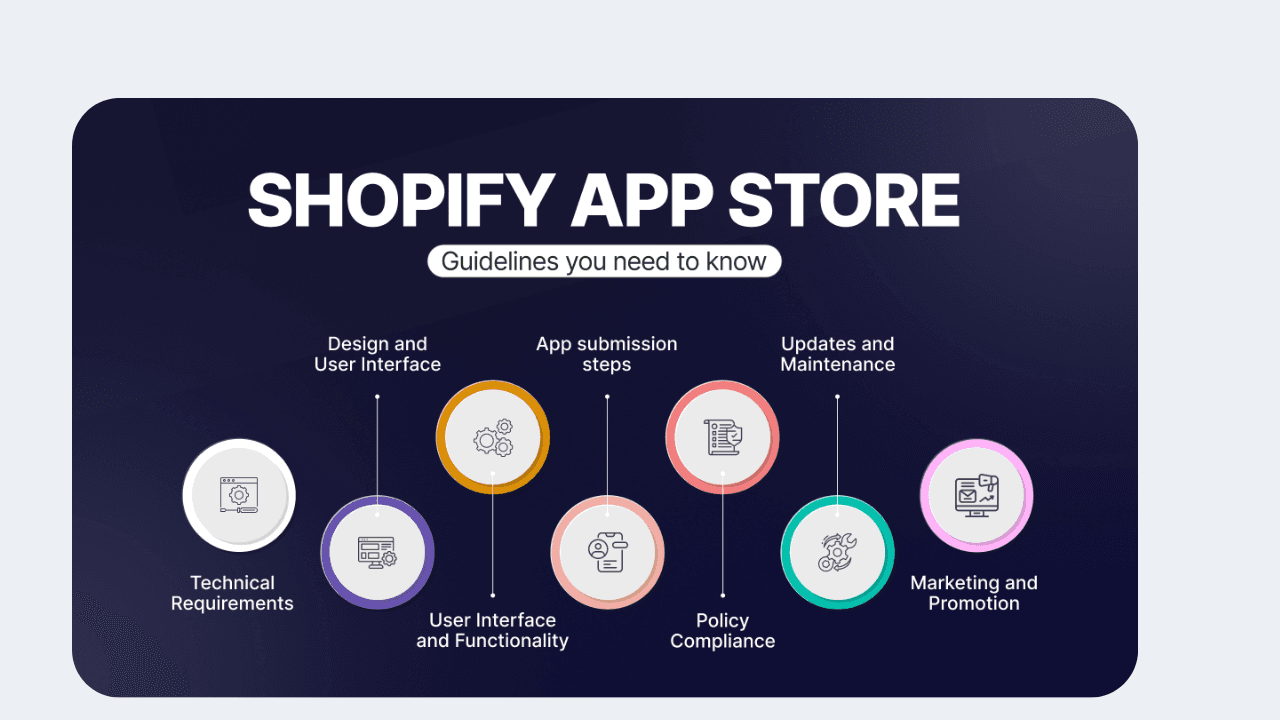
7. 24/7 Customer Support
Shopify provides around-the-clock customer support through multiple channels, including live chat, email, and phone. Whether you’re troubleshooting an issue or looking for guidance on best practices, Shopify’s support team is available to assist you at any time, which is particularly helpful for small businesses that may not have a dedicated IT team.
8. SEO and Marketing Tools
Shopify provides essential SEO features to help your store rank higher in search engines. It allows you to easily manage meta tags, product descriptions, and URLs to enhance your visibility online. Additionally, Shopify has integrated marketing tools such as email campaigns, social media sharing, and Google Ads integration, allowing small business owners to reach their target audience more effectively.
9. Mobile Compatibility
Since many consumers shop via smartphones, it’s crucial to have an ecommerce platform that is optimized for mobile devices. Shopify offers mobile-responsive themes and a mobile app, allowing store owners to manage their business on the go and ensuring customers can easily navigate the store from their phones.
10. Reliable Hosting
Shopify takes care of web hosting, ensuring fast loading speeds, reliable uptime, and scalability. You don’t have to worry about purchasing a separate hosting service, as Shopify’s infrastructure is built to handle high traffic volumes, ensuring that your store runs smoothly even during peak shopping seasons.
II. How Shopify Supports Small Business Growth
III. Top Shopify Alternatives for Small Business Owners
Here’s a more detailed exploration of top Shopify alternatives for small business owners. While Shopify is an excellent e-commerce platform, other platforms can provide similar functionality or unique features suited to different business needs. Let’s dive into some of the best Shopify alternatives that small business owners can consider:
3.1. Wix eCommerce
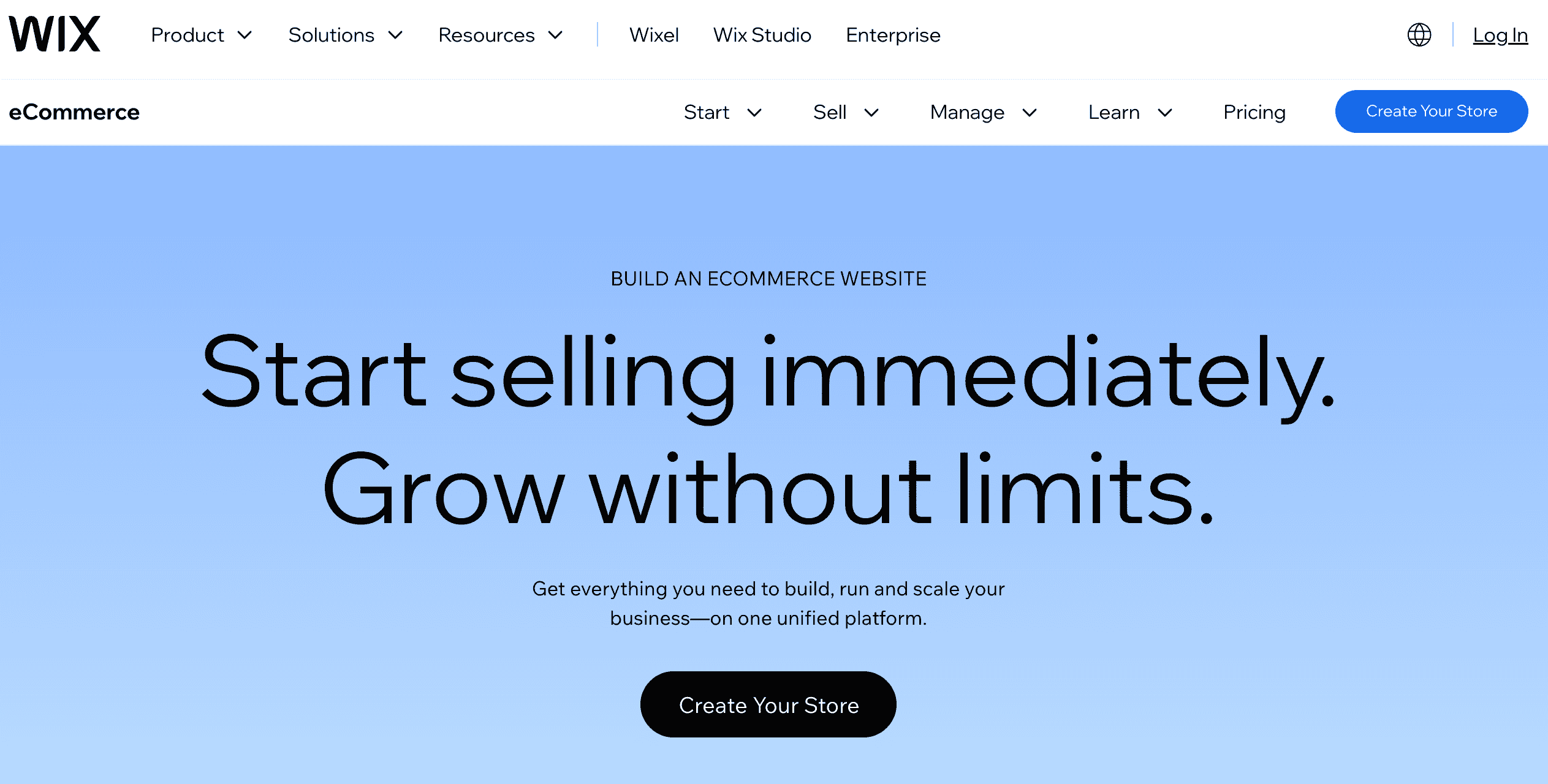
Wix is known for its drag-and-drop website builder, making it an ideal option for small business owners who want a simple yet effective way to set up their online store. With Wix eCommerce, users can create visually appealing, professional-looking websites without needing to know how to code.
Key Features:
- Ease of Use: The intuitive drag-and-drop interface allows you to build and manage your online store quickly. This makes it perfect for small business owners without technical expertise.
- Customization: Wix offers a wide variety of templates and allows for deep customization, enabling you to adjust every element to align with your brand’s identity.
- Marketing Tools: Wix provides email marketing tools, SEO optimization features, and social media integration to help drive traffic and increase conversions.
- Mobile-Ready: Wix templates are mobile-friendly, ensuring your store looks great on smartphones and tablets.
Best For: Wix is a great choice for entrepreneurs who prioritize design flexibility and want an easy-to-use platform to create a unique store quickly.
Pricing: Starts at $27/month, with higher-tier plans offering additional features such as abandoned cart recovery and extra storage.
3.2. BigCommerce
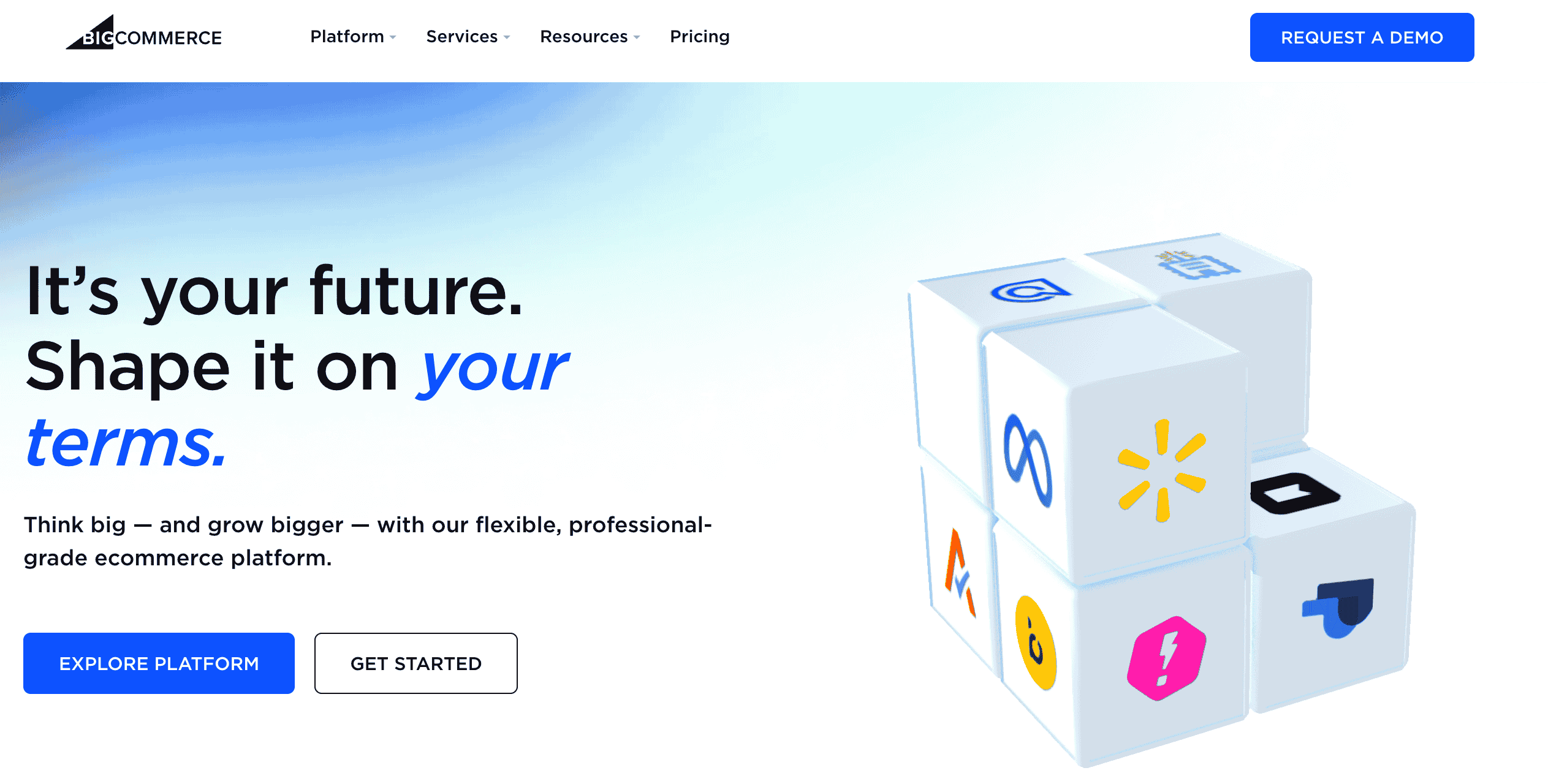 BigCommerce is a powerful e-commerce platform designed to scale as your business grows. While Shopify is often considered the go-to for small businesses, BigCommerce stands out for offering a rich set of features without additional transaction fees.
BigCommerce is a powerful e-commerce platform designed to scale as your business grows. While Shopify is often considered the go-to for small businesses, BigCommerce stands out for offering a rich set of features without additional transaction fees.
Key Features:
- No Transaction Fees: One of the major benefits of BigCommerce over Shopify is that there are no additional transaction fees, which can save your business money, especially if you have a high sales volume.
- Built-in Features: BigCommerce comes with advanced SEO features, customizable product options, and support for multiple payment gateways. It also offers advanced shipping and tax options.
- Scalability: BigCommerce is perfect for businesses planning to grow. It offers robust tools to scale your store, including advanced analytics, shipping solutions, and integrations with major marketplaces like Amazon and eBay.
- Multi-Channel Selling: BigCommerce supports selling on platforms like Facebook, Instagram, Google Shopping, and even Amazon, helping you reach customers on different channels.
Best For: BigCommerce is ideal for growing businesses looking for an all-in-one e-commerce solution that can handle large product catalogs and integrate with multiple sales channels.
Pricing: Plans start at $39/month, with additional features like advanced reporting and more integrations available in higher-tier plans.
3.3. Squarespace
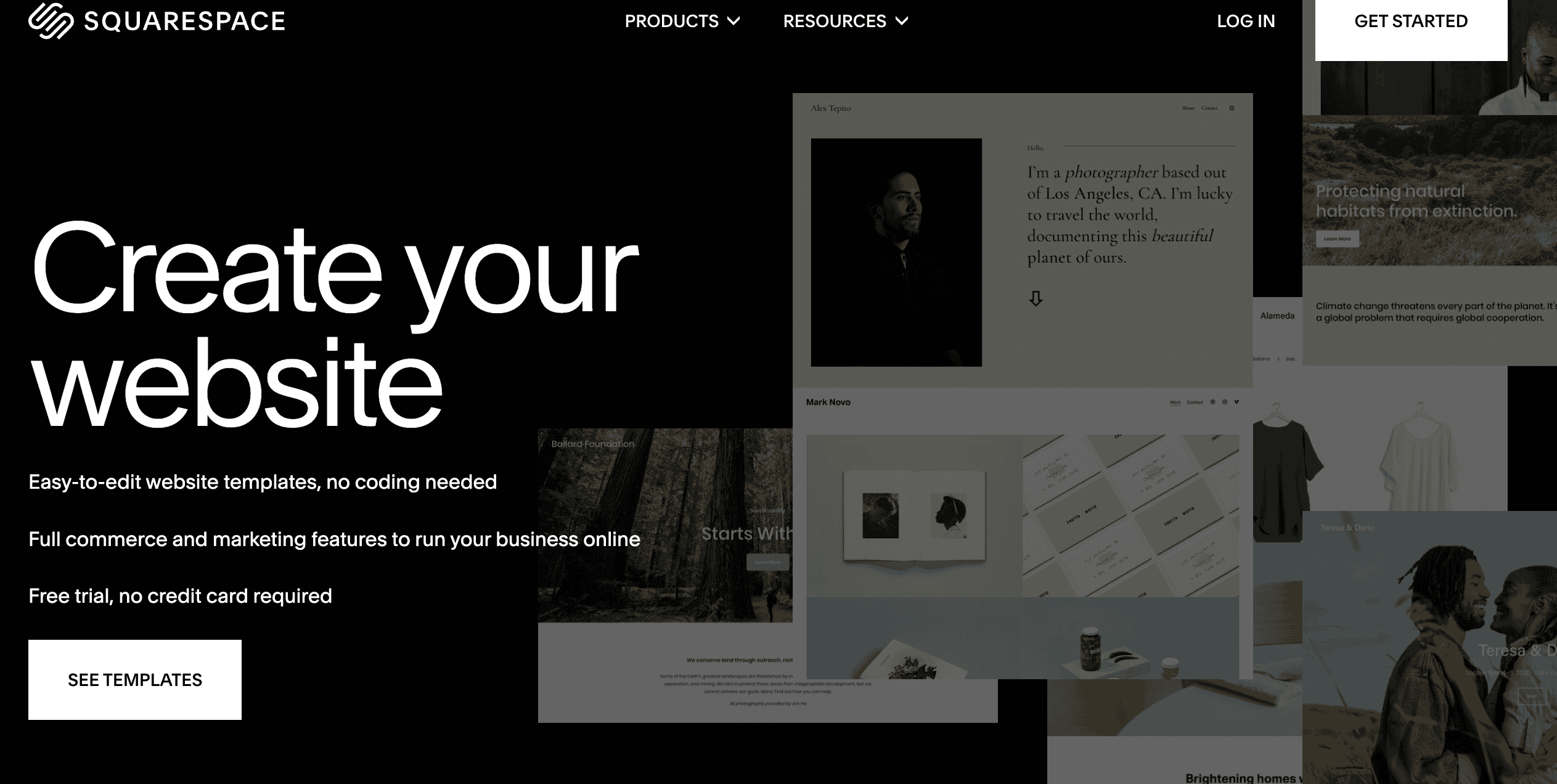 Squarespace is well-known for its beautiful, high-quality templates and is a top choice for small businesses that focus heavily on branding and aesthetic. It offers a simple website builder that’s ideal for small stores that also want to showcase their products in a visually stunning way.
Squarespace is well-known for its beautiful, high-quality templates and is a top choice for small businesses that focus heavily on branding and aesthetic. It offers a simple website builder that’s ideal for small stores that also want to showcase their products in a visually stunning way.
Key Features:
- Design-Centric: Squarespace has an extensive library of stunning templates, which are fully customizable. The templates are especially ideal for businesses in creative industries like art, fashion, and photography.
- Integrated E-Commerce: Squarespace includes integrated e-commerce tools like product galleries, inventory management, and payment processing.
- Mobile Optimization: All Squarespace templates are automatically mobile-optimized, ensuring that your store looks great on all devices.
- Marketing Tools: You’ll have access to built-in SEO tools, email campaigns, and social media integrations to help drive traffic to your store.
Best For: Squarespace is best suited for small businesses that prioritize visual appeal and need a simple yet attractive platform for their online store. It's particularly great for businesses in the creative sectors like photography, design, or fashion.
Pricing: Plans start at $23/month, with additional features available in higher-tier plans.
3.4. WooCommerce (on WordPress)
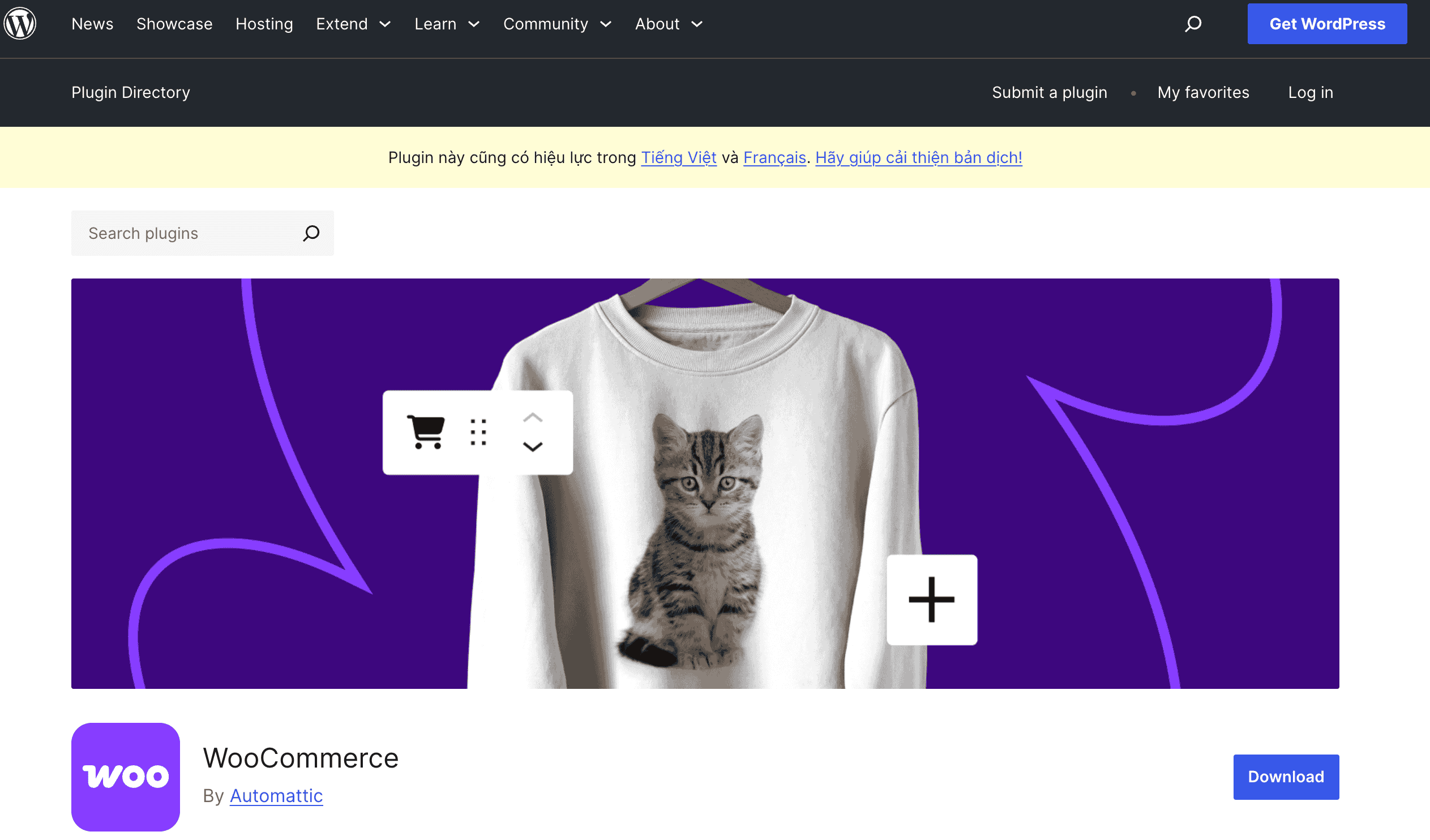
WooCommerce is an open-source platform that allows you to turn your WordPress site into a fully functional online store. As one of the most popular e-commerce solutions in the world, WooCommerce offers complete control and customization over your online store.
Key Features:
- Complete Customization: WooCommerce is highly customizable, allowing you to extend the platform with thousands of plugins to meet your business needs. This is perfect for businesses that want to have full control over the design and functionality of their site.
- Open-Source: As an open-source platform, WooCommerce gives you complete control over your site’s code. You can change anything and everything about your store, from how it looks to how it functions.
- Low Cost: The WooCommerce plugin itself is free, though you will need to pay for web hosting, a domain name, and certain plugins to unlock additional features.
- WordPress Integration: Since WooCommerce is built on WordPress, it integrates well with the world’s most popular content management system, providing endless opportunities for customization and content marketing.
Best For: WooCommerce is ideal for small business owners who already have a WordPress site and want to add e-commerce functionality. It’s also perfect for businesses that need full control over their website’s customization and functionality.
Pricing: The WooCommerce plugin is free, but you’ll need to invest in web hosting and any additional premium plugins or themes you choose.
3.5. Shift4Shop
Shift4Shop (formerly known as 3dcart) offers a comprehensive e-commerce solution with features tailored to businesses of all sizes, especially those just starting out. It’s a highly customizable platform with an affordable pricing structure.
 Key Features:
Key Features:
- Free for U.S. Merchants: Shift4Shop is free for U.S. merchants who meet certain criteria, making it a great option for small business owners on a tight budget.
- No Transaction Fees: Like BigCommerce, Shift4Shop does not charge transaction fees, which means more profit for your business.
- Customizable Storefront: Shift4Shop provides various templates and customization tools, allowing you to create a professional-looking online store that meets your business needs.
- Built-In Features: It offers SEO optimization, inventory management, shipping integration, and payment gateway options without requiring additional apps or plugins.
Best For: Shift4Shop is perfect for budget-conscious small businesses that want to keep costs low while still gaining access to powerful e-commerce features.
Pricing: Free for U.S. merchants with a credit card processing requirement. Paid plans start at $29/month.
3.6. Ecwid
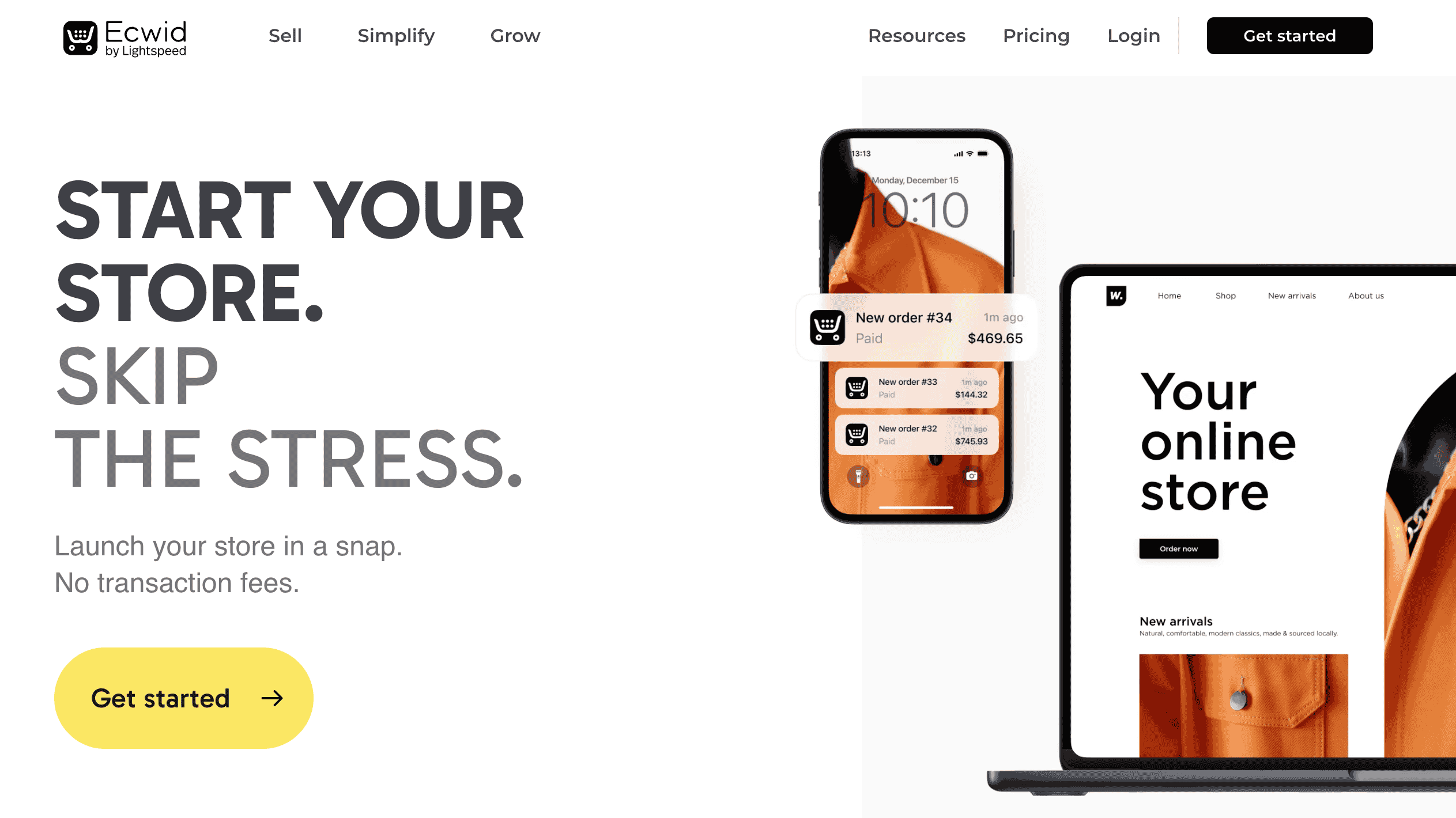 Ecwid is an add-on e-commerce solution that allows you to integrate an online store into your existing website. It’s perfect for small business owners who already have a website and want to add e-commerce functionality without rebuilding their site.
Ecwid is an add-on e-commerce solution that allows you to integrate an online store into your existing website. It’s perfect for small business owners who already have a website and want to add e-commerce functionality without rebuilding their site.
Key Features:
- Seamless Integration: Ecwid integrates with any existing website, allowing you to add e-commerce functionality quickly and easily.
- Multi-Channel Selling: Like Shopify and BigCommerce, Ecwid allows you to sell on multiple platforms, including Facebook, Instagram, Amazon, and eBay.
- Affordability: Ecwid offers a free plan for businesses with a small number of products. Paid plans offer additional features like unlimited products, marketing tools, and integrations.
- Easy Setup: Setting up Ecwid is easy, even for those without any technical skills. It works well with platforms like WordPress, Wix, and Weebly.
Best For: Ecwid is a great option for small businesses with existing websites that want to add e-commerce functionality without switching to a completely new platform.
Pricing:The free plan allows for 10 products. Paid plans start at $15/month.
Conclusion
While Shopify is a top choice for small business owners due to its powerful features, ease of use, and scalability, there are many alternatives that cater to different business needs. Whether you prioritize design flexibility, customization, affordability, or multi-channel selling, there is a platform that can help your business thrive online.
Consider your business goals, technical skills, and budget before making a decision. Each of these alternatives offers unique features that could be the perfect fit for your business’s growth.
